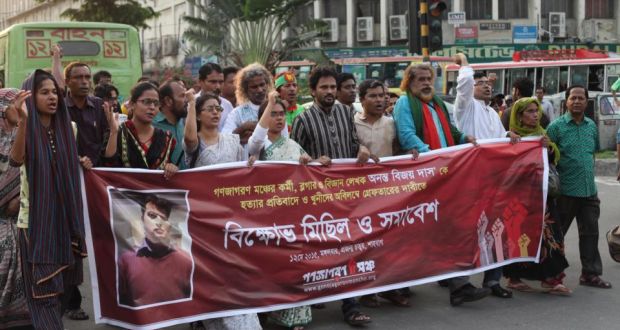Originally published in Deutsche Welle
?The government can?t protect people in their bedrooms? the prime minister angrily retorted when questioned about the brutal murder of a young couple, both journalists, in their own home. Three years later the police have not made any progress in their investigation. No charges have been brought. After the murder of the bloggers it seems, the government is unable to protect you in the streets, at a book fair or even on the doorstep of your own home.

Intolerance appears to be the order of the day in Bangladesh, impunity the general rule and denial the default? response. Since the government and the entire state machinery have been so occupied with arresting, killing and or arranging for the disappearance of opposition activists, any citizen not directly linked to the power structures is a potential target not only for the state machinery, but also for a host of racketeers, extortionists, fundamentalists or plain opportunists.? The judiciary no longer allows anyone to challenge the government even more worryingly the police are demanding that torture be made legal.
Blogger Ananta Bijoy Das was particularly vulnerable. He was outspoken, rational and defiant. He had openly supported other bloggers and activists named on the ?hit list? circulated by Islamists. The list of 84 had already been whittled down. Until the morning of May 12 only 76 were left. Now there are only 75 alive.
According to police reports, the secular blogger was hacked down with machetes at 8:30 am on the morning of May 12, 2015. His killers were lying in wait. They spotted him on his doorstep in Sylhet as he was heading off to work. They chased him down the street and cornered him in a nearby field. There they hacked him to death. His wounds were strikingly similar to those suffered by bloggers Avijit Roy and Washiqur Rahman. His killers had left a signature for all to see.
For its part, the government is hell bent on quelling any form of dissent. Members of the opposition are being killed, kidnapped, arrested and tortured. But even ordinary citizens who show any signs of resistance are brutally attacked. Police officers stood by while female students were molested during the Bangla New Year celebrations on Dhaka University campus. When a farcical official investigation declared the police had done no wrong, students protested.? The police responded by brutally attacking them, injuring many and arresting others. With the government expending so much energy on protecting itself, protection of the general public is not even on its radar.
In a status entry on his Facebook profile, Das had questioned the police?s role in the killing of bloggers Roy and Rahman. More significantly perhaps, his last post, minutes before his murder, focused on the news that an MP from the ruling Awami League party had wanted to whip a secular university teacher. Questioning the powers in the sky is one thing, but when one questions both the powers above and the powers?below, one is asking for trouble. At least in today?s Bangladesh.
Shahidul Alam is a Bangladeshi photographer, writer, curator and activist. A former president of the Bangladesh Photographic Society, Alam?s work has been exhibited in MOMA, Centre Georges Pompidou and Tate Modern. A speaker at Harvard, Stanford, UCLA, Oxford and Cambridge universities, Alam is a visiting professor of Sunderland University and an Honorary Fellow of the Royal Photographic Society in the UK. He has been member of The Bobs jury in 2012-2015. @shahidul
Be First to Comment